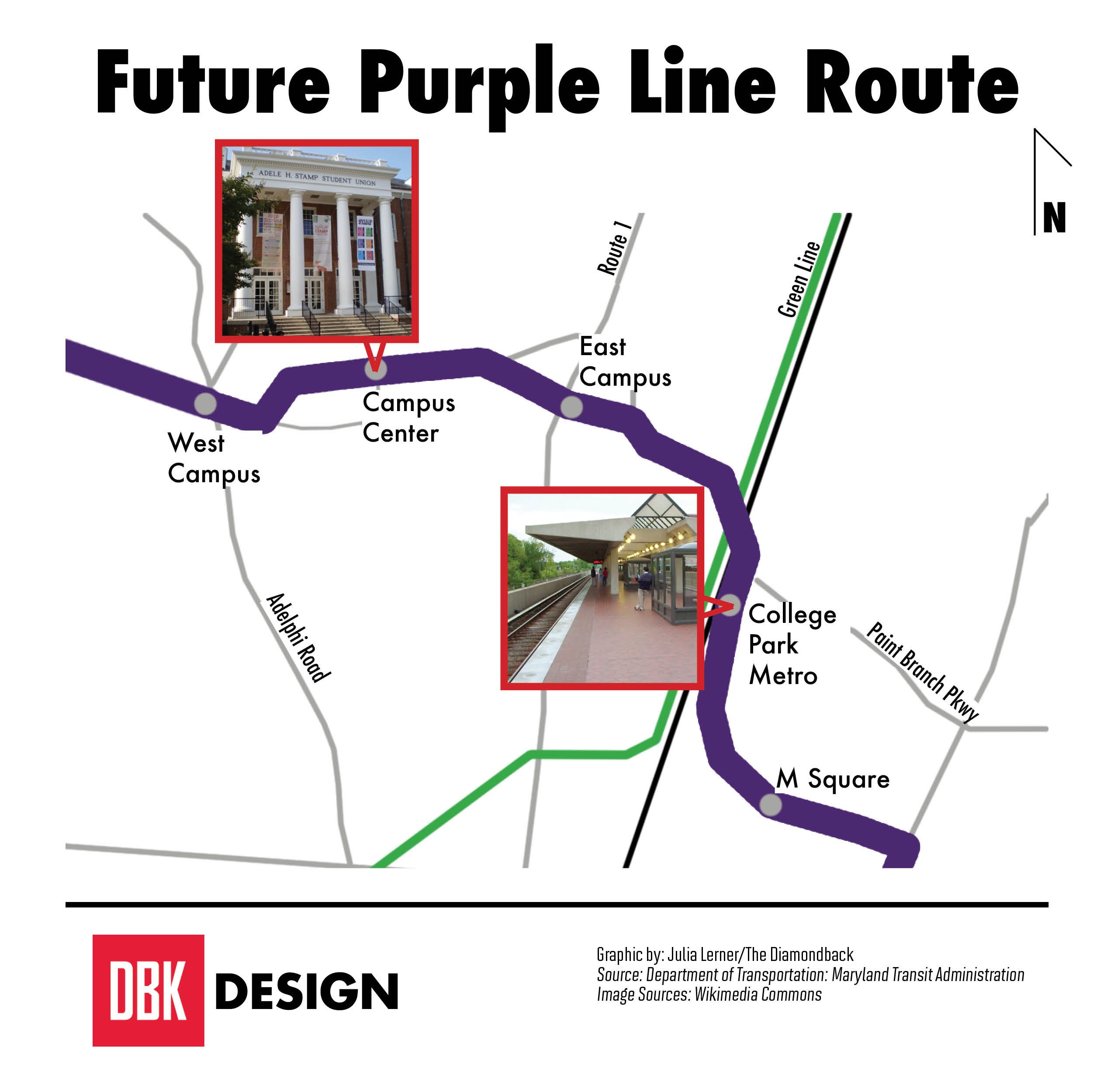The future of the Purple Line is at risk under President Trump’s proposed 2018 budget from earlier this month, but College Park officials said they are hopeful the project will continue.
Trump’s proposal would decrease federal funding for the Purple Line, a 16.2-mile light-rail system that would run from Bethesda to New Carrollton and would also pass through College Park.
Under Trump’s proposal, localities would have to fund transportation projects that do not have federal agreements, and the state of Maryland cannot afford the $2 billion Purple Line unless the government covers about half the costs, according to The Washington Post. The project was four days away from receiving $900 million in federal aid in August when a judge ruled the Purple Line needed to address ridership projections and safety issues before it could receive the funding.
[Read More: UMD and City of College Park officials show excitement for Purple Line ]
“If the Trump budget were to pass … it would have a devastating impact on our region’s transportation system, and would kill the Purple Line,” College Park Mayor Patrick Wojahn said.
Trump’s budget would cut millions in federal grants, according to The Post. The New Starts program — a federal grant that appropriates about $2.3 billion each year for transit projects — partially funds the Purple Line, and would be slashed severely if this budget passes, Wojahn said.
However, Wojahn said he remains hopeful the budget will not pass in its current form, and that Congress will intervene.
“The president proposes; the congress disposes,” Wojahn said, paraphrasing Franklin Delano Roosevelt. “The point being that the president’s budget is only a proposal.”
The Purple Line is dependent on federal government funding and cannot progress if that is not provided, Prince George’s County Council Vice-Chair Dannielle Glaros said. However, she added the Purple Line is the type of project Trump should get behind, as he supported publicly and privately funded projects throughout his campaign.
“I also hope that [the federal government] will give weight to projects like ours that are structured for public-private partnership,” Glaros said.
Eric Olson, executive director of the College Park City-University Partnership, echoed Wojahn’s sentiments, saying he’s confident Maryland members of Congress will ensure the Purple Line project moves forward.
[A U.S. district judge has decided to stall Purple Line construction — again]
“It’s clear the federal budget proposal across the board is a budget that’s sort of intended to shock … it appears to be an opening negotiation,” Olson said.
On Wednesday, state Gov. Larry Hogan affirmed his support for the Purple Line in a meeting with U.S. Transportation Secretary Elaine Chao, according to Bethesda Magazine.
“It’s good to know that the governor stands with the rest of delegation in support of [the Purple Line],” Glaros said.
Glaros said U.S. District Judge Richard J. Leon’s ruling that stated the Purple Line’s ridership projections must be redone is the most concerning detriment to the project right now. In January, the Federal Transit Administration and Maryland Transit Administration submitted “additional information,” and they expect to hear back on whether the Purple Line can move forward any day now, Glaros said.
Despite his optimism that Congress will intervene and amend the budget to help support the Purple Line, Wojahn said continued delays to the project negatively affect this city’s transportation.
“The biggest problem is getting … people back and forth between the east part of the Maryland suburbs and the west part of the Maryland suburbs,” Wojahn said. “If we don’t have [the Purple Line] as a tool to solve that problem, it’s only going to get worse.”
In addition to cutting funding for the Purple Line, Trump’s budget proposal will limit other federally funded transportation programs in College Park, such as bike trails, pedestrian infrastructure, transit rail and bus infrastructure, as well as federally funded transportation enhancements, Olson said.
The public transportation the Purple Line would provide is also expected to take 7,000 cars off the road in the College Park area, Olson said, citing the project’s Draft Environmental Impact Statement.
“If [Purple Line] funding goes away, it makes it harder to do the job of transitioning into a more walkable, bikeable community rather than just an auto center,” Olson said.
The project’s completion was originally scheduled for 2022, and that date hasn’t changed despite this setback, Glaros said.



